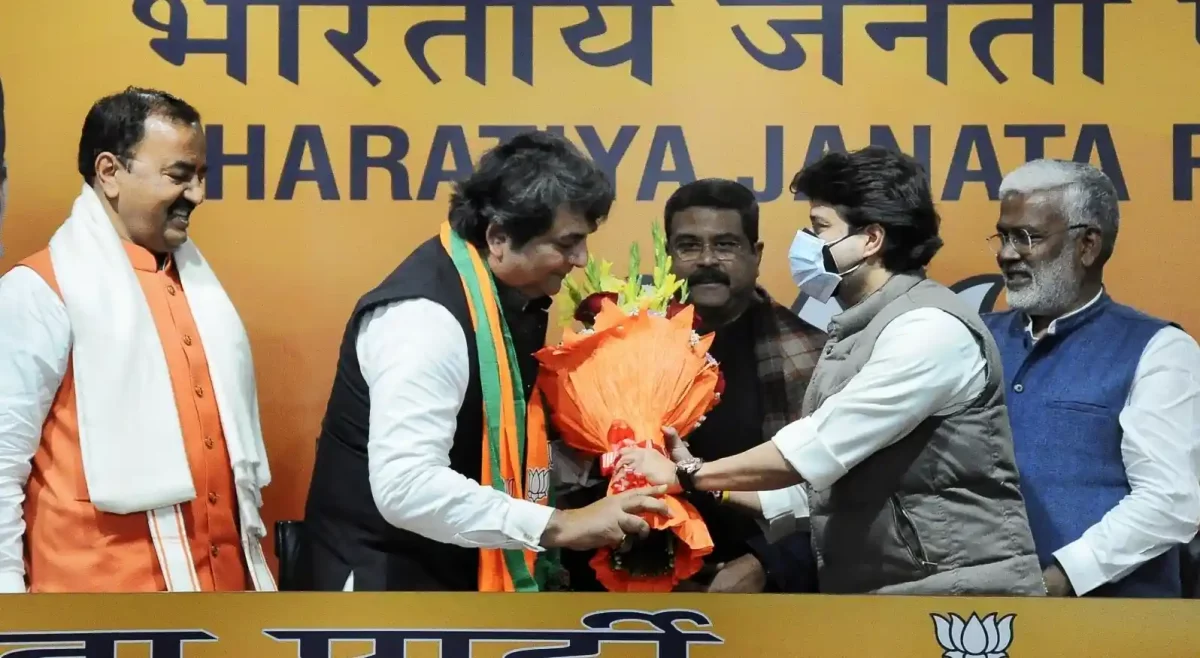A political analyst while talking about the exodus of the Gen-next from Congress remarked "ideological fidelity is an oxymoron." Over a period of time, a host of Congress leaders, who once strutted around flaunting the badge of "secularism" have switched over to the Bharatiya Janata Party, which they once described as "the party which practises politics of hate."
After Jyotiraditya Scindia, Jitin Prasad, another Gandhi loyalist, RPN Singh quit the Congress to join the BJP. Singh's shifting allegiance apparently was being viewed as a personal jolt to Priyanka Gandhi Vadra and Rahul Gandhi. Incidentally, RPN Singh's name also featured in the Congress' star campaigner list released 48 hours back.
If RPN's entry came as a major boost for the BJP, it has put a huge question mark on the style of functioning within the Congress. There are whispers and murmurs in the Congress corridor that the clan-Sonia-Rahul-Priyanka was "not letting the Gen-next grow in the party." All eyes are now on Rajasthan Congress leader, Sachin Pilot.
बीजेपी में शामिल होने के बाद राष्ट्रीय अध्यक्ष श्री जे.पी.नड्डा जी, गृह मंत्री श्री अमित शाह जी, यूपी के मुख्यमंत्री श्री योगी आदित्यनाथ जी सहित बीजेपी के वरिष्ठ नेताओं से भेंट कर भाजपा परिवार में मुझे शामिल करने के लिए हृदय से धन्यवाद दिया। pic.twitter.com/VU9gESoCLC
— RPN Singh (@SinghRPN) January 25, 2022
RPN Singh, who was one of the AICC office bearers, in-charge of Jharkhand was apparently feeling "stifled" within the organisation "for quite some time", a Congress leader said. It was revealed that the relationship between RPN Singh and the Gandhis started souring after Prime Minister Narendra Modi's move to revoke the special status for Jammu and Kashmir. It was claimed that RPN Singh, Scindia, Prasada were against the Congress attacking the Centre over the issue. The Gen-Next felt that Modi's decision was "in keeping with the public mood." The young Turks also felt that Rahul Gandhi's relentless attack on the Prime Minister was "damaging the party."
Even after the electoral victory in Jharkhand, the relationship between RPN Singh and Gandhis "did not improve," a Congress leader said. His supporters claimed that RPN Singh also had little role to play" in candidate selection.
It was learnt that RPN Singh was planning to join the BJP along with Jitin Prasada, but things didn't work out. He waited patiently. The opportunity arrived with the exit of Swami Prasad Maurya from BJP.
Both Swami and RPN belong to the Kurmi community. The BJP apprehended that Maurya's exit from the party, also a sitting MLA from Padrauna assembly berth was going to have a major impact on the OBC votes for the party. Speculations are now rife that BJP could field RPN Singh, a member of the royal family from Padrauna in eastern Uttar Pradesh against Maurya. Singh incidentally has been a three-time MLA from Padrauna.
Immediately after RPN Singh quit the party, the Congress while talking about an "ideological battle" said that "only those with courage can carry the party forward." Ideological moorings, loyalty or not, it's clear that the Gen-Next has been deserting the Congress ship since the grand old party has stopped growing. As a senior party functionary put it-"Congress is like a ship stuck in stagnant water."
Starting from Scindia, Prasada, Sushmita Dev (joined the TMC), Haryana heavyweights, Birendra Singh, Rao inderjit Singh among others had abandoned Congress for a greener pasture-which is BJP at this juncture.
The Gen-Next also felt slighted as the party high command was not doing anything about the old guards and sensed that even the dissenting G-23 members were "here to stay." Adopting politics as their career, these leaders felt that "there was no room for their individual growth in the Congress". A party leader quipped-"power is a glue. When you realise that the party was nowhere near coming to power in the near future, one starts looking out for fresher pastures."
Also Read: It is a battle between saffron, red and blue in Purvanachal that will decide Uttar Pradesh's fate
Also Read: Transforming Uttar Pradesh: An Upcoming Multi-modal Connectivity Hub




















